22+ Sample Attendance Lists
-
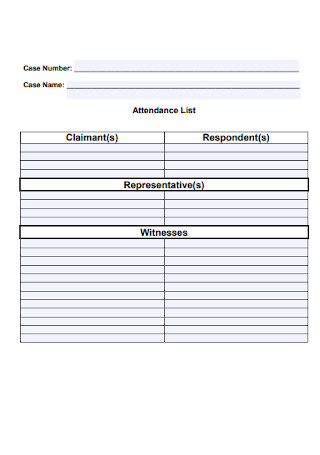
Attendance List Example
download now -
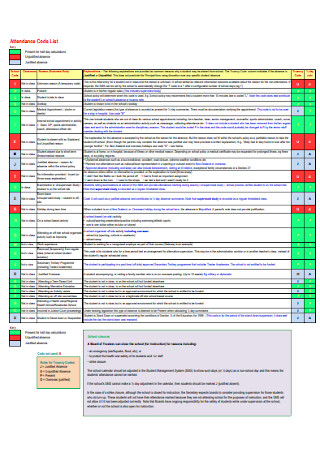
Attendance Code List
download now -
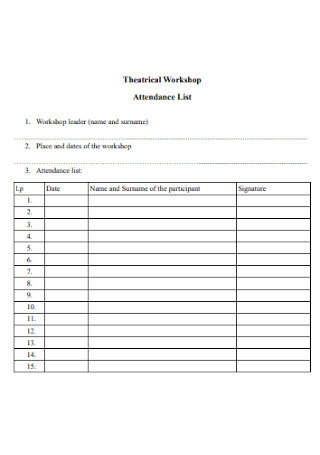
Theatrical Workshop Attendance List
download now -
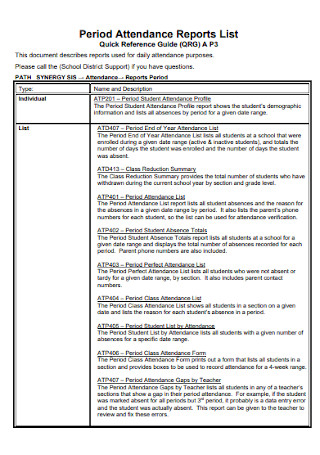
Period Attendance Reports List
download now -
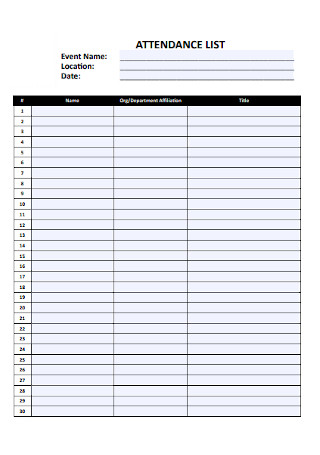
Event Attendance List Template
download now -
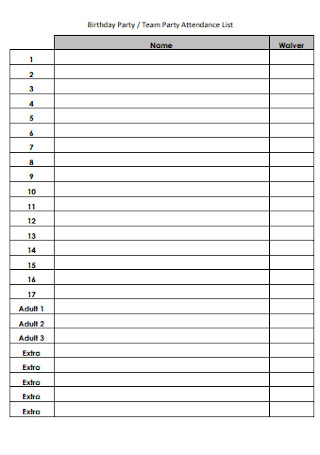
Team Party Attendance List
download now -
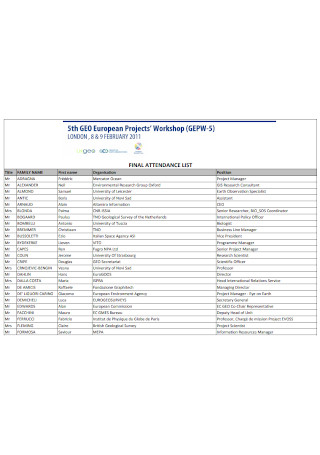
Final Attendance List
download now -

Meeting Attendance List
download now -

Attendance List Format
download now -
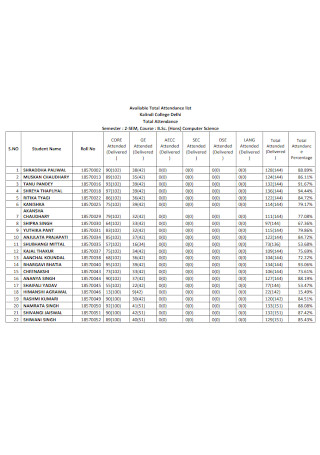
Available Total Attendance List
download now -
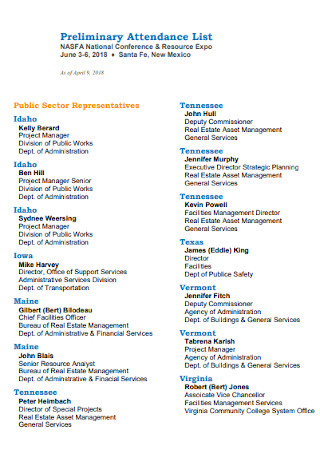
Preliminary Attendance List Template
download now -
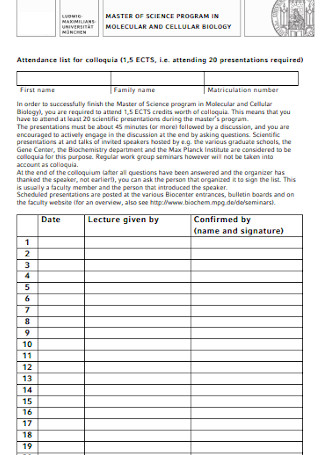
Science Program Attendance List
download now -
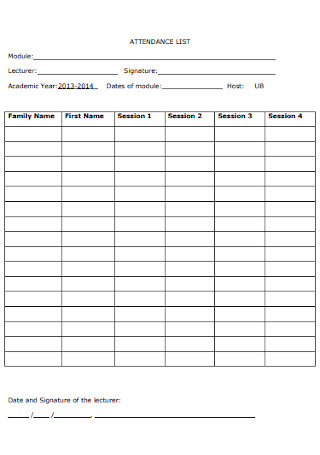
University Attendance List
download now -
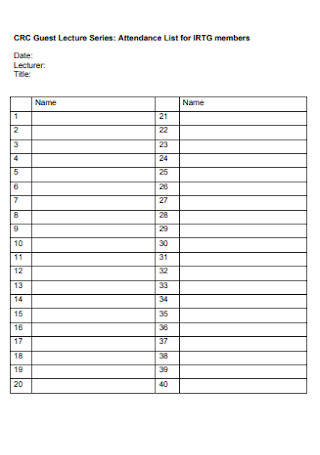
Members Attendance List
download now -
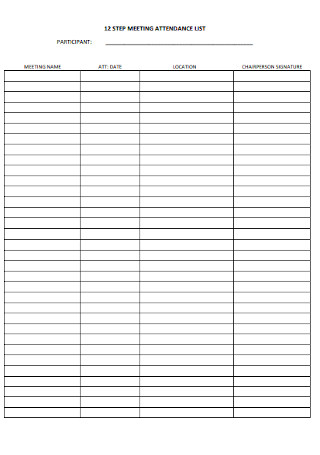
Meetiing Attendance List Template
download now -
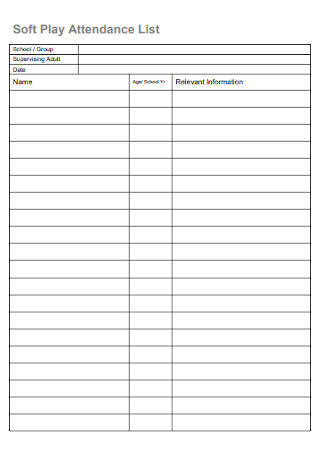
Soft Play Attendance List
download now -
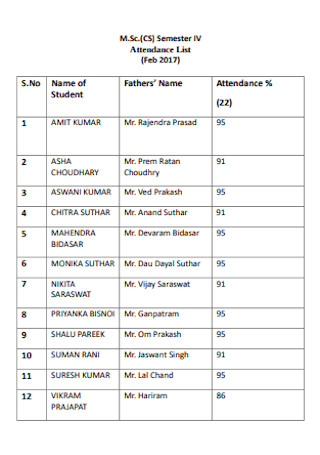
Semester Attendance List
download now -
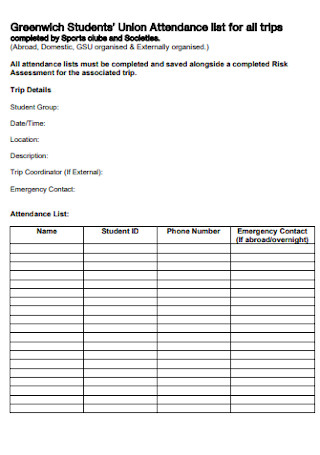
Trips Attendance List
download now -
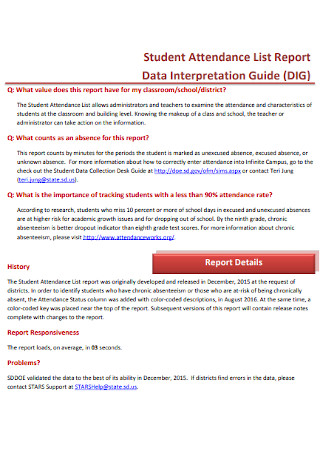
Student Attendance List Report
download now -
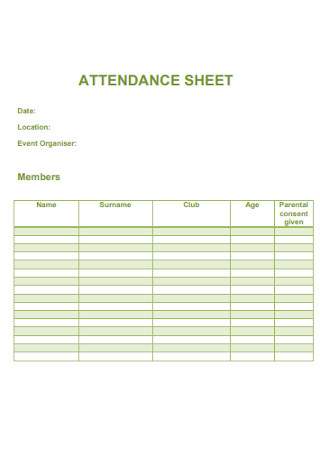
Basic Attendance List Template
download now -
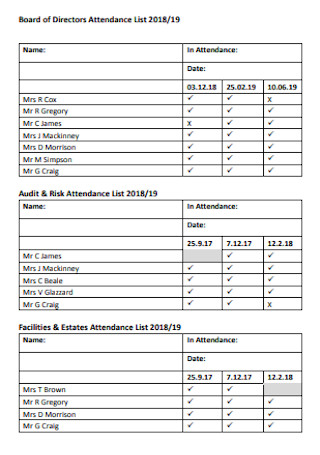
Board of Directors Attendance List
download now -
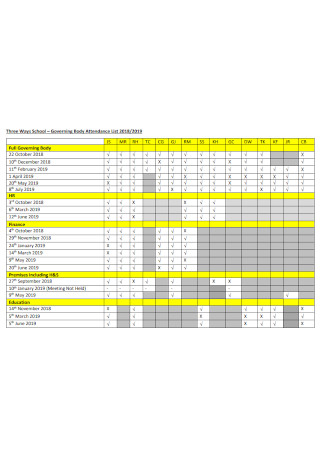
School Attendance List
download now -
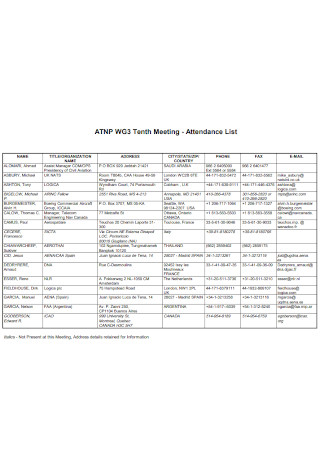
Tenth Meeting Attendance List
download now
FREE Attendance List s to Download
22+ Sample Attendance Lists
What Are Attendance Lists?
The Present Elements in Standard Attendance Lists
How to Make Excellent Attendance Lists
FAQs
What are the ways to track employee attendance?
Is attendance really necessary in school?
What happens if you have low attendance?
What Are Attendance Lists?
An attendance depicts a situation where a group of people turns up to a scheduled meeting, class, event, or activity. The attendance sheet, a document where every attendee should register for recordkeeping, has been valued not only in the academic and business setting but also for meetings, parties, sports, and more. But sometimes, keeping track of whoever attends an event or activity can be a hassle and time-consuming. So attendance lists exist to record the data of attendees quickly and conveniently. In a list, the instructions and labels are already pre-formatted. Attendees only need to fill out their details chronologically. For example, student A is the fourth person who wrote on the list. Thus, student B shall fill in the blanks of the fifth row of the list.
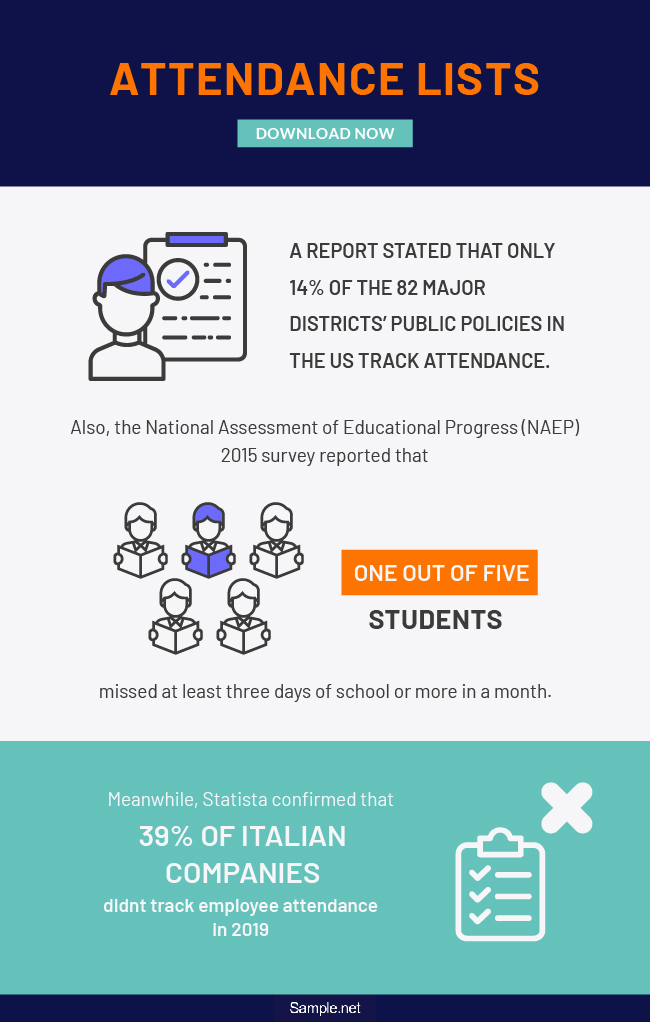
A report stated that only 14% of the 82 major districts’ public policies in the US track attendance.
Also, the National Assessment of Educational Progress (NAEP) 2015 survey reported that one out of five students missed at least three days of school or more in a month.
Meanwhile, Statista confirmed that 39% of Italian companies did not track their employees’ attendance in 2019.
Why is the Attendance List Important?
The primary purpose of an attendance list is to track attendance, as simple as that. Why so? Attendance records contain useful information for various purposes. First, the attendance works as a checklist to see who were actively participating in class or at work. Is it fair to pay an employee who was mostly absent with the same salary as those who worked on time and without absences? Second, attendance lists resolve common issues. Maybe a student complains about not getting perfect attendance since he or she did attend classes daily. However, the issue lies in how the student was late many times. Tardiness also affects these records.
Furthermore, the attendance list is a reliable tracking chart. Maybe there is a seminar inviting many visitors. Each guest will have to write down their details under the list for identification purposes. If anything happens where you must contact a specific visitor, the attendance already shows the contact info. Another popular use of attendance lists is for a reward system. Maybe a student or employee who attends without any absence would receive incentives at the end of a term. Thus, people would be driven to turn up daily. Lastly, the list works for documentation. Due to the list’s recorded details, an employer can ask why a specific worker was absent for particular days. And the employer decides if the said employee’s reason is excused or not.
Who Creates the Attendance List?
Generally, anyone assigned to track the attendance prepares the attendance list, whether it is the manager, HR, teacher, or marketer. And the designated person should make a reliable attendance list that helps fulfill his or her role in tracking attendance. Of course, others who were not assigned as the attendance tracker can create the list. But the tracker should know how to work on the prepared document. At the end of the day, the tracker is to be blamed if anything wrong occurs to the attendance tracking system.
The Present Elements in Standard Attendance Lists
While the attendance list’s meaning and purpose are clear to you, are you familiar with what a standard attendance list looks like? Although attendance sheets may differ from one application to another, there are a few common elements to notice. In this section, find out what is present or absent from the elements of attendance lists.
How to Make Excellent Attendance Lists
Now that you have familiarized the attendance list’s elements, are you ready to make the attendance list itself? Rest assured, it is not as complicated as it seems. How so? We have a collection of attendance list templates prepared just for you. There is no need to begin from scratch since templates are pre-formatted and ready to use anytime. But to make sure your attendance list is an excellent one rather than a standard example, do not forget to observe these five simple steps:
Step 1: Identify the Attendance List’s Purpose
What is the attendance list used for? A clear vision of the goal or purpose is essential for how the list should turn out. Are you making that list for employee attendance or maybe a special event? Once you identified your purpose, make sure your list does not back away from your goal. Perhaps you ended up creating a format that applies to a school attendance rather than for work. Rest assured that the purpose’s awareness leads you in the right direction of making an effective attendance list.
Step 2: Insert the Elements of an Attendance List
Can you recall those elements discussed earlier? Check if your attendance list already has them. If not, insert what is still necessary to add. But, do not just blindly include elements one after the other. There should be a sense of organization in terms of how you present them. For example, you might have placed the time out section before the time in, which should be the other way around. Thus, observe a proper arrangement to the list’s presentation of each element.
Step 3: Estimate the Number of Attendees to Accommodate
If you already have a planned layout on the whole list, then good. But, do you think your list is enough to accommodate all attendees who are supposed to log in the attendance? Review it. Maybe there were only thirty blank rows for attendees to fill out, yet there is a total of fifty attendees expected to accommodate. That is not right. How can the extra twenty attendees log their attendance? To prevent that situation, always estimate the attendee number. Or perhaps, provide more rows and columns in case more will come.
Step 4: Observe an Easy Format
Attendance lists are meant to be user-friendly. If not, then a difficult process would have attendees line up to log their attendance. And if it takes too long to finish logging, people who arrive at 7:55 AM might log in at 8:01 AM, which is one-minute tardy already. Do not let that happen. A tip is to use graphic organizers to simplify the form. Using tables and charts is how such lists are expected anyway. That means there are columns and rows to list effectively, instead of just writing details without proper format.
Step 5: Update the Lists Regularly
Always double-check the list regularly. As you review, you might notice that some people who logged in have not logged out. Or perhaps, there were inaccurate records present in the form. Wrong records must be corrected to avoid issues in the data. Never forget to take notes of some changes in the attendance records, and use a digital clock and calendar to check the date and time. And most importantly, keep all records in a safe place. You never know when you might need them for tracking.
FAQs
What are the ways to track employee attendance?
Did you know that in Italy, 39% of companies did not track employee attendance in 2019? That is, according to Statista’s research survey. Learn not to apply that situation by using practical applications in tracking the attendance of every worker. Examples include the conventional attendance register, attendance spreadsheets, card-swiping, fingerprint scanning, retina scanning, and GPS tracking system.
Is attendance really necessary in school?
Based on a survey, one out of five students missed around three school days or more in a month. Absenteeism is slowly affecting the passion of students to study in class. So, lessening absences is a must. Therefore, school attendance is necessary, particularly in colleges.
What happens if you have low attendance?
Low attendance affects work and academic performance. Although standards differ in every application, it is common that the percentage lower than 75% is considered a low attendance. For example, the Central Board of Secondary Education (CBSE) even announced that students must have 75% in attendance to be eligible for the board examination.
American director Woody Allen once said, “80% of success is showing up.” It does entirely mean that attending any meeting, interview, or event guarantees you success. But, just showing up gives you many opportunities that can affect your success. Apply that to the importance of attendance, and attendees would miss a lot of things just from being absent for certain days. And wrong records from the attendance will already affect the attendees’ performance. So whether you handle classes, lead training sessions, or manage any gathering where attendance is needed, be sure you got a dependable and quick system for tracking—attendance lists.
